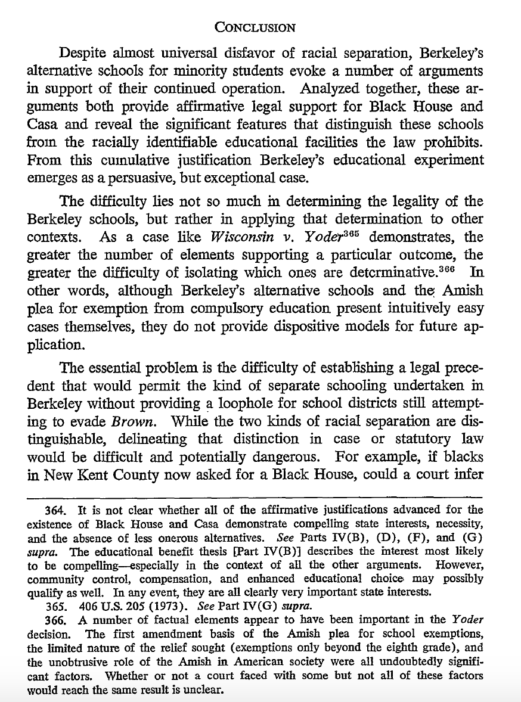In this law journal article, Susan Frelich Appleton offers a thorough examination of two of Berkeley’s alternative schools, Black House and Casa de la Raza, and the legal arguments around segregation and educational experimentation that they raised.
Appleton begins by examining the history of Black House and Casa de la Raza, working largely from personal interviews with the heads of these schools and other officials in Berkeley’s public education system. (Appleton was a Cal law student when she composed this article.)
Black House, she notes, began in October 1970; its total enrollment hovered around 75 tenth, eleventh and twelfth graders. Its mission was to develop traditional skills (of reading and math, say) through the use of ethnically oriented materials, if possible. Casa de La Raza was similarly oriented to developing traditional skills, but also featured bilingual education and a strong orientation toward community involvement.
Appleton then outlines the constitutional issues that pertained to the establishment of alternative schools like Black House and Casa de La Raza, focusing in particular on the Civil Rights Act of 1964. In this section, Appelton anticipated the objections that the Nixon administration’s Department of Health, Education and Welfare (HEW) would make to the constitutionality of Black House and Casa de la Raza: that they, in effect, sponsored a re-segregation of education and were in violation of the Civil Rights Act.
Her article ends by suggesting a legal argument that might be made in support of these two schools: “freedom of choice is permissible once segregation is undone,” she writes. Here she threads something of a legal needle: “The essential problem,” Appleton observes, “is the difficulty of establishing a legal precedent that would permit the kind of separate schooling undertaken in Berkeley without providing a loophole for school districts still attempting to evade Brown [v. Board of Education].”
An “Editor’s Note” appended to the article notes that, as Appleton’s piece was heading toward publication, both Black House and Casa de la Raza were “temporarily discontinued, pending negotiations between the Berkeley school system and HEW.” The discontinuation of Black House and Casa de la Raza proved final; the two schools were not revived.
